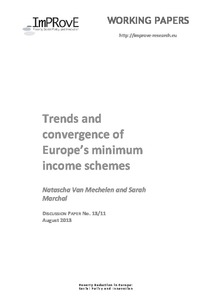Trends and convergence of Europe’s minimum income schemes
"This paper aims to contribute to the debate on whether or not European welfare states converge by assessing trends and patterns of convergence and divergence of European minimum income schemes in the period 1992/2001-2012. We expand on previous studies on convergence of social assistance schem...
| Main Authors: | , , |
|---|---|
| Institution: | ETUI-European Trade Union Institute |
| Format: | TEXT |
| Language: | English |
| Published: |
Antwerp
2013
ImPRovE |
| Subjects: | |
| Online Access: | https://www.labourline.org/KENTIKA-19124184124919423669-Trends-and-convergence-of-euro.htm |
| _version_ | 1771659900587343876 |
|---|---|
| author | ImPRovE, Antwerp Van Mechelen, Natascha Marchal, Sarah |
| author_facet | ImPRovE, Antwerp Van Mechelen, Natascha Marchal, Sarah |
| collection | Library items |
| description | "This paper aims to contribute to the debate on whether or not European welfare states converge by assessing trends and patterns of convergence and divergence of European minimum income schemes in the period 1992/2001-2012. We expand on previous studies on convergence of social assistance schemes in at least three ways. First, this paper provides a recent and detailed overview of social assistance benefit trends – detailed, that is, country-by-country. The focus is on cross-country variations rather than on the variation among groups of countries that are deemed to represent different welfare regimes. In addition, our analyses are based on original data drawn from a large network of country experts comprising all EU Member States except for Croatia, Cyprus and Malta. The country-focus as well as the involvement of national informants allows to contextualize our findings with regard to convergence and to clarify the underlying policy measures. Finally this paper covers a long time series, starting in the early 1990s up to 2012. We find that despite a marked increase in the spread of minimum income schemes, cross-country variation in the level of minimum income benefits has remained markedly stable. This stability however hides starkly different country experiences, with some laggard countries showing marked increases, whereas others continue to fall short. Some of these pre-crisis gains have evaporated in recent years. In addition, a substantial number of countries have allowed a further erosion of their benefit levels, especially in the 1990s, but still evident in the 2000s." |
| format | TEXT |
| geographic | EU countries |
| id | 19124184124919423669_dfd603715cb140aaa0915d52900783f8 |
| institution | ETUI-European Trade Union Institute |
| is_hierarchy_id | 19124184124919423669_dfd603715cb140aaa0915d52900783f8 |
| is_hierarchy_title | Trends and convergence of Europe’s minimum income schemes |
| language | English |
| physical | 28 p. Digital |
| publishDate | 2013 |
| publisher | Antwerp ImPRovE |
| spellingShingle | ImPRovE, Antwerp Van Mechelen, Natascha Marchal, Sarah guaranteed income minimum wage social assistance Trends and convergence of Europe’s minimum income schemes |
| thumbnail | https://www.labourline.org/Image_prev.jpg?Archive=100115792839 |
| title | Trends and convergence of Europe’s minimum income schemes |
| topic | guaranteed income minimum wage social assistance |
| url | https://www.labourline.org/KENTIKA-19124184124919423669-Trends-and-convergence-of-euro.htm |

